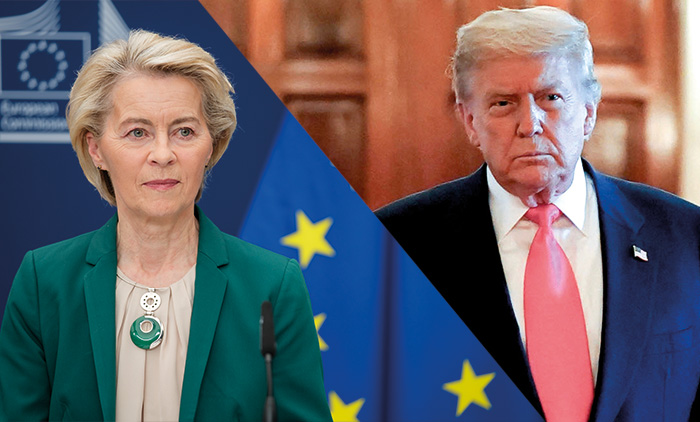Analyses / Europe, European Union, NATO
1 August 2025
Confronting Europe’s Vassalisation: Resistance or Rhetoric

The level of subordination revealed by the agreement between Ursula von der Leyen and Donald Trump has sparked awareness of the European Union’s (EU) economic, technological, and political impasse vis-à-vis the United States. This latest transgression by the European Commission President spells an existential crisis for the EU. An opinion piece by Rémi Bourgeot, economist and engineer, Associate Research Fellow at the French Institute for International and Strategic Affairs.
The unilateral imposition of United States (US) tariffs on European production has caught the public’s attention. In reality, their relatively moderate level of 15 % overall is the result of much more substantial concessions made by the European Commission. The EU is committing itself to further increasing its dependence on a range of issues. In order to save the precarious industrial status quo of ultra-exporting industries, particularly in Germany, it is compromising its technological future. Europe is relinquishing its ambition for autonomy in the digital, defence, and energy sectors, in line with the latest North Atlantic Treaty Organisation (NATO) summit. Amid the threat of trade chaos, Donald Trump is thus succeeding in imposing not only a new paradigm of unilateral tariffs, but also a broader logic of economic—and geopolitical—domination over the most aligned countries. In return, those face the risk of an accelerated retreat from the global stage.
Many EU politicians have expressed their embarrassment at the revelation to the general public of the EU’s stalemate. Calls for countermeasures against the US digital sector overlook the stage and real extent of Europe’s capitulation. In exchange for tariffs that are half the threatened 30 %, the Commission has effectively given Donald Trump assurances that it will abandon any meaningful policy of technological competition.
Given Germany’s trade surplus with the US, a policy of specific rebalancing through targeted tariffs and investment would have been legitimate. European leaders should have accepted reasonable means to end that a long time ago, while refusing to compromise on the idea of widespread servitude that would bind future generations. A level-headed approach would have resulted in low tariffs without any additional concessions on technological, military, and energy autonomy. By focusing exclusively on the immediate interests of ultra-exporting industries, like car manufacturing, and on the United States’ most excessive demands, the unrealistic prospect of 30 % tariffs in the long term has led Ursula von der Leyen to undermine the EU’s technological potential.
The European Union’s current state of paralysis is deeper than this embarrassing trade agreement would suggest. It concerns its governance, extreme bureaucratisation, lobbying, and the regurgitation of generic ideologies, imported from America’s culture war, by all political factions, from the far right to the far left to the centre. The United States is gradually recovering from its industrial meltdown, despite its educational and cultural crisis, by mobilising its historical strengths. This ability to bounce back relies in particular on the financial resources offered to creative and scientific minds. Conversely, Europe is falling into the habit of copying the most detrimental aspects of US governance and mass culture, without the qualities of a system that gives itself the scientific means to achieve strength. The United States is beginning to industrialise, thanks to low energy costs. Conversely, the Commission is exporting the chaos of Germany’s energy policy to countries that could still benefit from a rational and environmentally friendly energy infrastructure, and is now promising massive imports of American liquified natural gas at prohibitive prices.
While the weakness of the European position had been blatant for months, representatives of US organisations in Brussels, such as the website Politico Europe, defended the Commission’s position with tenacity, even praising its strength and unity. These sham negotiations have in effect served to seal Europe’s retreat in the face of US economic interests. Looking beyond Donald Trump’s peculiar style and manner, US international policy retains a bipartisan dimension. The Biden administration’s Inflation Reduction Act was already a sweeping protectionist policy aimed at industrialising the US. European governments’ lack of familiarity with European and global affairs paved the way for the von der Leyen Commission’s vacuum, combining submission on the international stage with authoritarianism at home.
More than just a tool for trade rebalancing, Donald Trump sees trade barriers as a form of sanction. It was in light of the escalation in recent months with China, which stood up to him effectively, that he focused on the countries most closely aligned with the US, amid a disastrous geopolitical context. This logic has been particularly apparent in relation to Gaza, where the EU has refused to exert any influence, taking US intimidation to the letter, although it has obvious economic levers to put an end to a policy of annihilation in its neighbourhood. Much more than a simple matter of bargaining strategy, Europe’s political retreat points to a crisis of civilisation.

